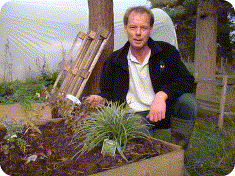Herb Blether
by Patrick Vickery
'You can take a horse to water but you can't make it drink'. A famous saying, that, undoubtedly true, but what if the horse is dead in the first place, eh, what then? Could you even get it to water? Would you want to? Now there's an interesting thought, particularly for anyone who's ever tried to motivate someone else to do something that they might not otherwise wish to do (all those involved in garden committees - or any other type of committee for that matter - take note). Only this is not about horses, dead or alive, no, no, certainly not, but about something completely different. Herbs. It's about herbs.
 It started on my way to work, you see. I was listening to the Terry Wogan show on the car radio. "A banana", he said, "is the biggest herb". "Well really", I snorted, "what nonsense, highly unlikely, that". So when I got home I looked it up on the internet - one of those search engines with a ridiculous name: 'Wisenut', 'Big Mama', 'Google', 'Searchy', something like that. I typed in "Big herb", you see, and surveyed the results. Now apart from an unusual Californian character calling himself 'Big Herb' (tattoo artist and contortionist), the results were rather surprising. A banana is not only a fruit but a herb as well, you see, and not the biggest herb either, no, no, that honour goes to the Ginkgo Biloba tree - much bigger apparently.
It started on my way to work, you see. I was listening to the Terry Wogan show on the car radio. "A banana", he said, "is the biggest herb". "Well really", I snorted, "what nonsense, highly unlikely, that". So when I got home I looked it up on the internet - one of those search engines with a ridiculous name: 'Wisenut', 'Big Mama', 'Google', 'Searchy', something like that. I typed in "Big herb", you see, and surveyed the results. Now apart from an unusual Californian character calling himself 'Big Herb' (tattoo artist and contortionist), the results were rather surprising. A banana is not only a fruit but a herb as well, you see, and not the biggest herb either, no, no, that honour goes to the Ginkgo Biloba tree - much bigger apparently.
But what is a herb anyway? That's the burning question.
"...any plant with leaves, seeds or flowers used for flavouring, food, medicine or perfume..." (Oxford English Dictionary)
Herbs take a variety of forms, of course, from land and sea, big and small, leaves, seeds, nuts, fruits, fungus, seaweed, bark ... the list goes on and on. Strange names too, some of them. 'Old Man's Nostril' for example, otherwise known as 'Snotweed' or 'Spiderwort', which can be eaten as a salad; 'Wortwort', a name given to a cluster of plants thought to cure warts; 'Bladderwrack', a ribbon seaweed much prized for its medicinal purposes; 'Lizzy-run-up-the-hedge' (known also as 'Robin-run-in-the-hedge'); 'Doonhead Clock' (dandelion); 'Devil's Shoestrings'; 'Chuckberry' ; and then 'Vomitwort' to mention but a few.
But what about the humble banana versus the Ginkgo Biloba tree, which has more herb-like qualities?
My investigations went as follows.
First, the banana.
Banana leaves are good for cough and chest complaints; mashed banana softens the skin; the inside of a freshly peeled banana skin makes a good first aid dressing for minor wounds and burns and can also ease corn discomforture......and there's plenty more besides. Fascinating stuff, eh? The list goes on.....
So how does the Ginkgo Biloba compare with the banana? My research threw up the following facts
The most ancient of living trees, the Ginkgo, originally from China, known also as the Maidenhair tree, the Kew tree and the Fossil tree, it can reach a height of around forty metres. The leaves and seeds are used for a variety of medical conditions and Ginkgo is currently one of the best selling herbal medicines in Europe, a concoction taken by many middle aged and elderly folk to increase mental alertness and aid memory. Yes, an interesting herb, the Ginkgo Biloba, well worth investigating if you have the time.
So there you are: a banana is a herb, the Ginkgo Biloba is probably the biggest herb (though no doubt somebody will know of one bigger), and both could be extremely handy in times of need.
Now what about this dead horse scenario? Any herbal concoctions for dead horses, I wonder? Well no, not really, a decent burial is what's required of course, and then - after a suitable interval of mourning - start afresh with a new one. Advice that applies equally well to garden committees, or any other type of committee for that matter, should you be experiencing committee problems just now. So there you are.
(Copyright 2005 Patrick Vickery)
Gardening in Scotland
(more about the author)